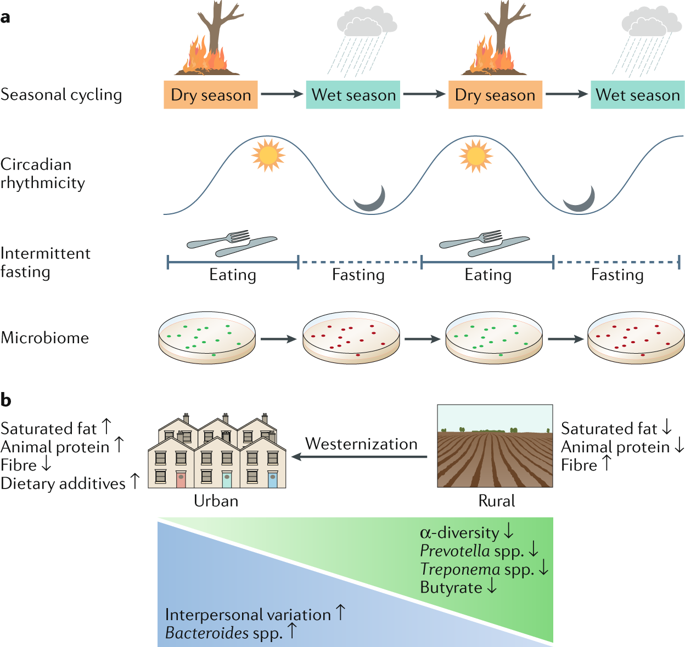当前位置:
X-MOL 学术
›
Nat. Rev. Microbiol.
›
论文详情
Our official English website, www.x-mol.net, welcomes your
feedback! (Note: you will need to create a separate account there.)
Diet-microbiota interactions and personalized nutrition.
Nature Reviews Microbiology ( IF 69.2 ) Pub Date : 2019-09-20 , DOI: 10.1038/s41579-019-0256-8 Aleksandra A Kolodziejczyk 1 , Danping Zheng 1, 2 , Eran Elinav 1, 3
Nature Reviews Microbiology ( IF 69.2 ) Pub Date : 2019-09-20 , DOI: 10.1038/s41579-019-0256-8 Aleksandra A Kolodziejczyk 1 , Danping Zheng 1, 2 , Eran Elinav 1, 3
Affiliation

|
Conceptual scientific and medical advances have led to a recent realization that there may be no single, one-size-fits-all diet and that differential human responses to dietary inputs may rather be driven by unique and quantifiable host and microbiome features. Integration of these person-specific host and microbiome readouts into actionable modules may complement traditional food measurement approaches in devising diets that are of benefit to the individual. Although many host-derived factors are hardwired and difficult to modulate, the microbiome may be more readily reshaped by environmental factors such as dietary exposures and is increasingly recognized to potentially impact human physiology by participating in digestion, the absorption of nutrients, shaping of the mucosal immune response and the synthesis or modulation of a plethora of potentially bioactive compounds. Thus, diet-induced microbiota alterations may be harnessed in order to induce changes in host physiology, including disease development and progression. However, major limitations in 'big-data' processing and analysis still limit our interpretive and translational capabilities concerning these person-specific host, microbiome and diet interactions. In this Review, we describe the latest advances in understanding diet-microbiota interactions, the individuality of gut microbiota composition and how this knowledge could be harnessed for personalized nutrition strategies to improve human health.
中文翻译:

饮食-微生物群相互作用和个性化营养。
概念科学和医学的进步导致最近认识到可能没有单一的、一刀切的饮食,人类对饮食输入的不同反应可能是由独特且可量化的宿主和微生物组特征驱动的。将这些针对个人的宿主和微生物组读数整合到可操作的模块中,可以补充传统的食物测量方法,以设计对个人有益的饮食。尽管许多源自宿主的因素是硬连线且难以调节,但微生物组可能更容易被环境因素(如饮食暴露)重塑,并且越来越多地被认为通过参与消化、营养吸收、黏膜免疫反应的塑造和大量潜在生物活性化合物的合成或调节。因此,可以利用饮食诱导的微生物群改变来诱导宿主生理学的变化,包括疾病的发展和进展。然而,“大数据”处理和分析的主要限制仍然限制了我们对这些特定于人的宿主、微生物组和饮食相互作用的解释和翻译能力。在这篇综述中,我们描述了了解饮食-微生物群相互作用、肠道微生物群组成的个体性以及如何利用这些知识制定个性化营养策略以改善人类健康方面的最新进展。包括疾病的发展和进展。然而,“大数据”处理和分析的主要限制仍然限制了我们对这些特定于人的宿主、微生物组和饮食相互作用的解释和翻译能力。在这篇综述中,我们描述了了解饮食-微生物群相互作用、肠道微生物群组成的个体性以及如何利用这些知识制定个性化营养策略以改善人类健康方面的最新进展。包括疾病的发展和进展。然而,“大数据”处理和分析的主要限制仍然限制了我们对这些特定于人的宿主、微生物组和饮食相互作用的解释和翻译能力。在这篇综述中,我们描述了了解饮食-微生物群相互作用、肠道微生物群组成的个体性以及如何利用这些知识制定个性化营养策略以改善人类健康方面的最新进展。
更新日期:2019-09-21
中文翻译:

饮食-微生物群相互作用和个性化营养。
概念科学和医学的进步导致最近认识到可能没有单一的、一刀切的饮食,人类对饮食输入的不同反应可能是由独特且可量化的宿主和微生物组特征驱动的。将这些针对个人的宿主和微生物组读数整合到可操作的模块中,可以补充传统的食物测量方法,以设计对个人有益的饮食。尽管许多源自宿主的因素是硬连线且难以调节,但微生物组可能更容易被环境因素(如饮食暴露)重塑,并且越来越多地被认为通过参与消化、营养吸收、黏膜免疫反应的塑造和大量潜在生物活性化合物的合成或调节。因此,可以利用饮食诱导的微生物群改变来诱导宿主生理学的变化,包括疾病的发展和进展。然而,“大数据”处理和分析的主要限制仍然限制了我们对这些特定于人的宿主、微生物组和饮食相互作用的解释和翻译能力。在这篇综述中,我们描述了了解饮食-微生物群相互作用、肠道微生物群组成的个体性以及如何利用这些知识制定个性化营养策略以改善人类健康方面的最新进展。包括疾病的发展和进展。然而,“大数据”处理和分析的主要限制仍然限制了我们对这些特定于人的宿主、微生物组和饮食相互作用的解释和翻译能力。在这篇综述中,我们描述了了解饮食-微生物群相互作用、肠道微生物群组成的个体性以及如何利用这些知识制定个性化营养策略以改善人类健康方面的最新进展。包括疾病的发展和进展。然而,“大数据”处理和分析的主要限制仍然限制了我们对这些特定于人的宿主、微生物组和饮食相互作用的解释和翻译能力。在这篇综述中,我们描述了了解饮食-微生物群相互作用、肠道微生物群组成的个体性以及如何利用这些知识制定个性化营养策略以改善人类健康方面的最新进展。











































 京公网安备 11010802027423号
京公网安备 11010802027423号